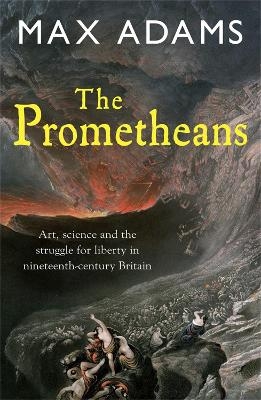
The Prometheans
John Martin and the generation that stole the future
Seiten
2010
Quercus Publishing (Verlag)
978-1-84916-173-2 (ISBN)
Quercus Publishing (Verlag)
978-1-84916-173-2 (ISBN)
The story of four maverick brothers, and a thrillingly ambitious portrait of Britain in an era of technological and political revolution.
The richly varied lives of the Martin brothers reflected the many upheavals of Britain in the age of Industrial Revolution. Low-born and largely unschooled, they were part of a new generation of artists, scientists and inventors who witnessed the creation of the modern world. William, the eldest, was a cussedly eccentric inventor who couldn't look at a piece of machinery without thinking about how to improve it; Richard, a courageous soldier, fought in the Peninsular War and at Waterloo; Jonathan, a hellfire preacher tormented by madness and touched with a visionary genius reminiscent of William Blake, almost burned down York Minster in 1829; while John, the youngest Martin, single-handedly invented, mastered and exhausted an entire genre of painting, the apocalyptic sublime, while playing host to the foremost writers, scientists and thinkers of his day. In The Prometheans Max Adams interweaves the fascinating story of these maverick siblings with a magisterial and multi-faceted account of the industrial, political and artistic ferment of early 19th-century Britain.
His narrative centres on a generation of inventors, artists and radical intellectuals (including the chemist Humphry Davy, the engineer George Stephenson, the social reformer Robert Owen and the poet Shelley) who were seeking to liberate humanity from the tyranny of material discomfort and political oppression. For Adams, the shared inspiration that binds this generation together is the cult of Prometheus, the titan of ancient Greek mythology who stole fire from Zeus to give to mortal man, and who became a potent symbol of political and personal liberation from the mid-18th century onwards. Whether writing about Davy's invention of the miner's safety lamp, the scandalous private life of the Prince Regent, the death of Shelley or J.M.W. Turner's use of colour, Adams's narrative is pacy, characterful, and rich in anecdote, quotation and memorable character sketch. Like John Martin himself, he has created a sprawling and brightly coloured canvas on an epic scale.
The richly varied lives of the Martin brothers reflected the many upheavals of Britain in the age of Industrial Revolution. Low-born and largely unschooled, they were part of a new generation of artists, scientists and inventors who witnessed the creation of the modern world. William, the eldest, was a cussedly eccentric inventor who couldn't look at a piece of machinery without thinking about how to improve it; Richard, a courageous soldier, fought in the Peninsular War and at Waterloo; Jonathan, a hellfire preacher tormented by madness and touched with a visionary genius reminiscent of William Blake, almost burned down York Minster in 1829; while John, the youngest Martin, single-handedly invented, mastered and exhausted an entire genre of painting, the apocalyptic sublime, while playing host to the foremost writers, scientists and thinkers of his day. In The Prometheans Max Adams interweaves the fascinating story of these maverick siblings with a magisterial and multi-faceted account of the industrial, political and artistic ferment of early 19th-century Britain.
His narrative centres on a generation of inventors, artists and radical intellectuals (including the chemist Humphry Davy, the engineer George Stephenson, the social reformer Robert Owen and the poet Shelley) who were seeking to liberate humanity from the tyranny of material discomfort and political oppression. For Adams, the shared inspiration that binds this generation together is the cult of Prometheus, the titan of ancient Greek mythology who stole fire from Zeus to give to mortal man, and who became a potent symbol of political and personal liberation from the mid-18th century onwards. Whether writing about Davy's invention of the miner's safety lamp, the scandalous private life of the Prince Regent, the death of Shelley or J.M.W. Turner's use of colour, Adams's narrative is pacy, characterful, and rich in anecdote, quotation and memorable character sketch. Like John Martin himself, he has created a sprawling and brightly coloured canvas on an epic scale.
Max Adams is the author of the widely praised Admiral Collingwood: Nelson's Own Hero. An archaeologist and TV documentary writer/producer, he lives and works in Newcastle.
Acknowledgements. List of illustrations. Forethought. The chains of slavery. The rights of man. Children of the Revolution. Mechanics of war. Brothers in arms. A million fires. Peace divided. A light in the darkness. Belshazzar's Feast. Paradise Lost. Playing with fire. The 'democratical' principle. Babylon-on-Thames. Survivors. Judgement. Notes and references. Bibliography. Index.
| Erscheint lt. Verlag | 4.3.2010 |
|---|---|
| Verlagsort | London |
| Sprache | englisch |
| Maße | 131 x 198 mm |
| Gewicht | 236 g |
| Themenwelt | Geschichte ► Allgemeine Geschichte ► Neuzeit (bis 1918) |
| Geisteswissenschaften ► Geschichte ► Regional- / Ländergeschichte | |
| Geschichte ► Teilgebiete der Geschichte ► Technikgeschichte | |
| Geschichte ► Teilgebiete der Geschichte ► Wirtschaftsgeschichte | |
| ISBN-10 | 1-84916-173-9 / 1849161739 |
| ISBN-13 | 978-1-84916-173-2 / 9781849161732 |
| Zustand | Neuware |
| Haben Sie eine Frage zum Produkt? |
Mehr entdecken
aus dem Bereich
aus dem Bereich
Europa 1848/49 und der Kampf für eine neue Welt
Buch | Hardcover (2023)
DVA (Verlag)
CHF 67,20
Giordano Bruno - ein ketzerisches Leben
Buch | Hardcover (2024)
C.H.Beck (Verlag)
CHF 41,85


